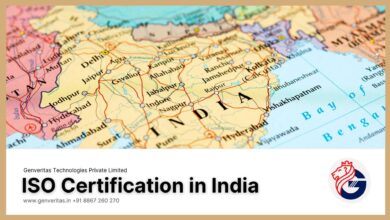Certification in India: Promoting Sustainable Farming and Consumer Trust

Organic farming has gained significant popularity worldwide due to its focus on sustainable practices and the production of chemical-free, environmentally friendly crops. In India, the demand for organic products has witnessed a steady rise, driven by health-conscious consumers who prioritize food safety and environmental sustainability. To ensure the authenticity and integrity of organic products, Organic Certification in India plays a crucial role. This article explores the organic certification process, its significance, regulatory bodies involved, consumer perception, and the challenges faced by organic farmers in India.
Understanding Organic Certification
Organic certification is a process that verifies and guarantees that agricultural products are grown and processed using organic farming methods. It involves adhering to strict guidelines and standards set by regulatory bodies. Organic farming practices focus on natural methods to maintain soil fertility, control pests and diseases, and minimize environmental impact. Organic certification ensures that farmers follow these practices, including the use of organic inputs, avoiding synthetic chemicals, and adopting sustainable farming techniques.
Importance of Organic Certification in India
In a country like India, where agriculture is the backbone of the economy and a significant portion of the population depends on farming, organic certification plays a crucial role. It not only promotes sustainable farming practices but also enhances consumer trust in organic products. With the growing concerns about the excessive use of pesticides and chemical fertilizers, organic certification ensures that consumers can make informed choices and have access to safe and healthy food options.
The Certification Process
The organic certification process involves several steps to ensure compliance with organic farming standards. Let’s take a closer look at the typical certification process in India:
- Application and Documentation: Farmers or producers interested in obtaining organic certification must submit an application to the relevant certification body. They need to provide detailed documentation about their farming practices, land history, seed sources, and other essential information.
- Inspection: Once the application is accepted, an authorized inspector visits the farm or production unit to assess its compliance with organic standards. The inspector evaluates various aspects such as soil management, crop rotation, pest and disease control, and record-keeping practices.
- Certification Decision: Based on the inspection findings, the certification body makes a decision regarding certification. If the farm or production unit meets the organic standards, a certificate is issued. In case of non-compliance, the farmer is provided with recommendations for improvement and given a specific timeframe for reevaluation.
- Annual Renewal and Auditing: Organic certification is not a one-time process. Certified farmers need to undergo an annual renewal process, which includes regular inspections and audits to ensure continuous adherence to organic standards.
Regulatory Bodies for Organic Certification in India
In India, several regulatory bodies are responsible for overseeing the organic certification process. The key organizations involved are:
- National Program for Organic Production (NPOP): NPOP is the central government’s initiative to regulate organic farming and certification in India. It sets the standards for organic production, accredits certification bodies, and provides guidelines for organic certification.
- Agricultural and Processed Food Products Export Development Authority (APEDA): APEDA is responsible for promoting the export of agricultural and processed food products from India. It recognizes and regulates certification bodies for organic products intended for export.
- Participatory Guarantee System (PGS): PGS is a grassroots-level certification system that involves the active participation of farmers and consumers. It promotes organic farming among small-scale farmers and local markets, ensuring traceability and transparency.
- State Organic Certification Agencies: Some Indian states have their own organic certification agencies that work in collaboration with NPOP and provide certification services at the state level.
These regulatory bodies work together to maintain the integrity of the organic certification process and ensure that organic products meet the required standards.
Benefits of Organic Certification
Organic certification offers numerous benefits to farmers, consumers, and the environment. Some of the key benefits include:
- Enhanced Market Access: Organic certification opens up new market opportunities, both domestically and internationally, as consumers seek organic products for their health and environmental benefits.
- Premium Pricing: Organic produce often commands higher prices in the market due to its perceived quality, nutritional value, and sustainable production methods. Organic certification helps farmers fetch better prices for their products, leading to improved profitability.
- Environmental Sustainability: Organic farming practices prioritize soil health, water conservation, and biodiversity conservation. By avoiding the use of synthetic chemicals, organic farmers contribute to the preservation of the environment and promote sustainable agriculture.
- Improved Health and Food Safety: Organic products are free from synthetic pesticides, chemical fertilizers, and genetically modified organisms (GMOs). Choosing organic food reduces the exposure to harmful chemicals and promotes healthier eating habits.
- Consumer Trust and Transparency: Organic certification assures consumers that the products they purchase meet specific organic standards. It provides transparency in the production process, fostering trust and loyalty among consumers.
Challenges and Limitations
While organic certification offers several advantages, it also comes with its own set of challenges and limitations in the Indian context. Some of the key challenges include:
- Limited Awareness and Knowledge: Many farmers, especially small-scale ones, lack awareness about organic farming practices and certification procedures. Educating and training farmers about organic methods is crucial to promote wider adoption.
- High Certification Costs: The certification process involves costs such as inspection fees, documentation, and compliance with specific standards. These costs can be a burden for small farmers, making certification less accessible for them.
- Supply Chain Integrity: Maintaining the integrity of the organic supply chain is essential to prevent contamination and ensure traceability. Challenges related to segregation, storage, transportation, and labeling of organic products need to be addressed effectively.
- Limited Market Infrastructure: Organic farmers often face difficulties in accessing markets that appreciate and pay a fair price for organic produce. Developing robust market infrastructure and connecting farmers directly with consumers can address this issue.
- Adulteration and Mislabeling: The increasing demand for organic products has led to instances of adulteration and mislabeling. Strict monitoring and enforcement of regulations are necessary to prevent fraudulent practices.
- Scaling Up Organic Production: Meeting the growing demand for organic products requires scaling up organic production. Encouraging more farmers to adopt organic farming methods and providing them with necessary support can help address this challenge.
Consumer Perception and Market Demand
The demand for organic products in India has witnessed a significant surge in recent years. Consumers are becoming increasingly conscious of the potential health and environmental impacts of conventional farming practices. They seek organic products as a healthier and more sustainable alternative. The rise in e-commerce platforms and the availability of organic products in supermarkets have further fueled the market demand. With proper certification and labeling, consumers can make informed choices and contribute to the growth of the organic sector in India.
Success Stories: Organic Farms in India
India has seen the emergence of successful organic farms that have not only achieved certification but also created a positive impact on the environment and local communities. Some notable examples include:
- Sikkim Organic Mission: Sikkim became India’s first fully organic state in 2016. The state government implemented organic farming practices on a large scale, leading to sustainable agriculture, increased biodiversity, and improved livelihoods for farmers.
- Jaivik Setu Farmer Producer Company: Located in Maharashtra, Jaivik Setu is a farmer producer company that promotes organic farming and connects organic farmers directly with consumers. It has created a successful market platform for organic produce, benefiting both farmers and consumers.
- Chetna Organic: Chetna Organic is an organization working with small-scale farmers in states like Andhra Pradesh, Odisha, and Maharashtra. It facilitates organic certification, fair trade practices, and market linkages, empowering farmers and promoting sustainable agriculture.
These success stories highlight the positive outcomes of organic certification and the potential for transforming the agricultural landscape in India.
FAQs about Organic Certification in India
- What is the validity period of organic certification in India?
- Organic certification is generally valid for one year. Farmers need to renew their certification annually through inspections and audits.
- Can small-scale farmers afford organic certification?
- Organic certification costs can be a burden for small-scale farmers. However, government schemes and subsidies, as well as participatory guarantee systems, provide more affordable certification options.
- Do organic farmers use any pesticides or fertilizers?
- Organic farmers use natural and organic inputs for pest and disease management, such as biopesticides, neem-based products, and organic compost. Synthetic pesticides and chemical fertilizers are strictly prohibited.
- Can organic certification be revoked?
- Yes, organic certification can be revoked if a farmer or producer fails to comply with organic standards or if fraudulent practices are detected.
- Are imported organic products certified in India?
- Imported organic products intended for sale in India need to be certified by a recognized certification body in the country of origin. They also undergo scrutiny by Indian regulatory authorities.
- Is organic certification mandatory for selling organic products?
- In India, organic certification is not mandatory for selling organic products in the domestic market. However, certification enhances consumer trust and helps in accessing premium markets.
Conclusion
Organic certification in India plays a vital role in promoting sustainable farming practices, ensuring food safety, and meeting consumer demand for organic products. It provides a reliable framework for farmers to adopt environmentally friendly practices and connects consumers with authentic organic produce. While challenges persist, the increasing awareness and market demand for organic products present opportunities for organic farming to thrive in India. By supporting organic certification and fostering a conducive ecosystem, India can lead the way in sustainable agriculture and contribute to a healthier and greener future.





